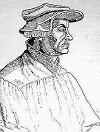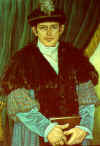Early Anabaptists
Martin Luther set many events in motion. He began a period when people heard (and some read) the Bible in their own language. As a result, many groups began to interpret the Bible for themselves, searching for the meaning of these stories for their own lives and situations. This led to a questioning of traditions, and sometimes a clamour for change - a period which is known as the Reformation.
Reform in Zurich
| Grossmunster, the Main Church in Zurich |
Huldrych Zwingli was the reformer guiding the process of change in the city of Zurich, Switzerland. Like Martin Luther, Zwingli believed that the church should use the Bible rather than church tradition as its guide. Although he was supported by most people in the area, some thought that he was moving too slowly and not making enough changes. When Zwingli gave the town council authority to make decisions about the church, some people disagreed strongly.
Conrad Grebel was one of these people. Early on he had been very excited about the changes that Zwingli was making, and supported him fully; by 1523 some doubts began to emerge. Grebel did not think that the reforms were going far enough, and it was taking longer than he had hoped. He and some of his friends wanted to do away with anything that was not described in the Bible. Zwingli's decision regarding the relationship between town council and the church was the last straw.
First Adult Re-Baptism
Sometime towards the end of January, 1525, Conrad Grebel and a small group met for Bible study in a house in Zurich. During the meeting George Blaurock asked Grebel to baptize him, after which Blaurock baptized several others. The town council found out and made further gatherings of this group illegal. Since these people had already been baptized as children, they were nicknamed "rebaptizers" or "Anabaptists."
This event is widely recognized as the beginning of the Anabaptist movement. Over the next ten years or so, other groups began to pop up in parts of Germany and Holland who also baptized adults. Although there was some contact between these groups, we are still not sure whether they began separately or because of connections with the group from Switzerland.
First Execution
Felix Manz was one of the people baptized by Blaurock at this early meeting. Like some of the others, he was constantly being arrested and spending time in prison. During one of these periods in prison he wrote "I Sing with Exultation," a song which remains part of the Mennonite tradition. On January 5, 1527 he was taken to the Limmat River, tied to a pole, and drowned - the first Anabaptist executed for his faith by Protestant authorities.
Created 1998 by Derek Suderman

